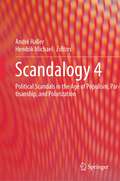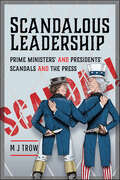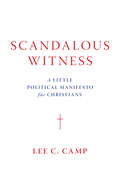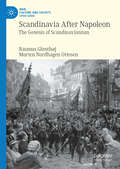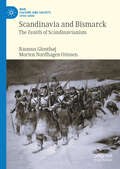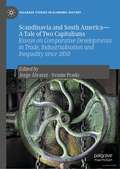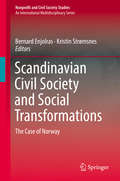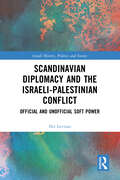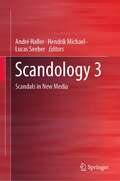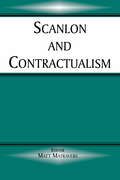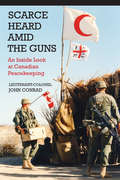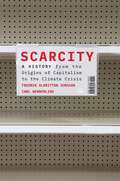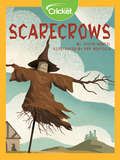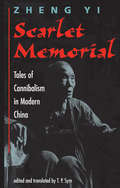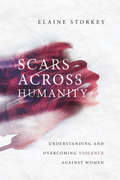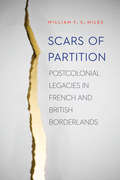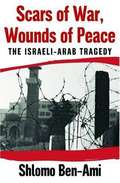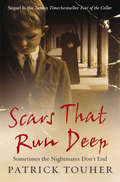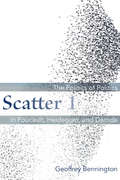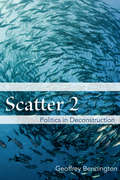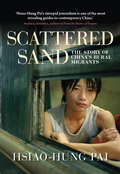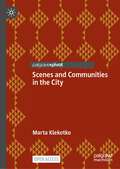- Table View
- List View
Scandalogy 4: Political Scandals in the Age of Populism, Partisanship, and Polarization
by André Haller Hendrik MichaelThis volume examines the growing presence of populism, partisanship, and polarization and analyzes what this means for scandalization processes. While politics appears to have entered a mode of perpetual crisis and growing dysfunctionality, the rapid succession of scandals may be a symptom of this crisis and its catalyst at the same time. The book provides a better definition of political scandals and discusses from an interdisciplinary and critical scientific perspective how such scandals are relevant to political developments and how they impact public discourse and media practices. International experts from various subfields of communication studies, political communication research as well as related disciplines contribute to the volume with conceptual, empirical, and methodological approaches which reflect on political scandals and the role of media and/or communication. Presenting a unique perspective and providing a first in-depth insight into the relationship between polarization, partisanship, populist communication, and scandalization, the book will appeal to students, researchers, and scholars from different disciplines, as well as practitioners and policy-makers interested in a better understanding of political scandals, their impact on public discourse and political developments, and their catalyzation through media and communication.
Scandalous Leadership: Prime Ministers' and Presidents' Scandals and the Press
by M. J. TrowAn exploration of the moral blemishes that have dogged the leaders of Great Britain and the United States. Before Britain had a prime minister – and before they invented America – the dictator Oliver Cromwell urged the artist Lely to paint him ‘warts and all’. This book deals with some of the ‘all’, but is mostly about the warts, the moral blemishes that have dogged the leaders of two of the greatest countries on earth for 300 years. Scandalously, there are still no qualifications necessary for the job of prime minister or president, two of the most important positions in the world. And that lack of ability shows itself in spades throughout these pages. Robert Walpole knew that ‘every man has his price’ and bought people accordingly. Viscount Goderich broke down in tears, begging the king to fire him. George Washington, the revered saint of American creation, blew with the wind and owned slaves. Abraham Lincoln was prepared to send African Americans back to Africa to save the Union. William Gladstone popped out from Downing street to ‘save’ prostitutes. David Lloyd George gave people titles for money. Warren Harding had a string of mistresses, as did John Kennedy. And all this happened before Donald Trump! Thank God the fourth estate was there, the free press watching every move of politicians. Who was watching them, of course, is another story. If you thought – and prayed – that the occupants of No. 10 and the White House were honorable, competent people, you’re in for a bit of a shock.
Scandalous Witness: A Little Political Manifesto for Christians
by Lee C. CampChristian identity is in moral and political crisis, scandalized by the many ways in which it has been coopted and misrepresented. Addressing this painful reality, Lee Camp writes that Christianity in America has been made into a bad public joke because of &“our failure to rightly understand what Christianity is.&” From this provocative claim, Camp&’s manifesto makes the convincing case that a renewed Christian politic is more essential than ever, one that is &“neither left nor right nor religious,&” but a prophetic way of life modeled after Jesus of Nazareth. Camp&’s robust vision exposes modern parodies of faith—the American concept of &“Christian values,&” for one—and challenges Christians to rethink who they are and how they participate in the modern world. Authentic gospel truth is a scandal to the American myth, he argues, and we are called to be scandalous witnesses.
Scandalous Witness: A Little Political Manifesto for Christians
by Lee C. CampChristian identity is in moral and political crisis, scandalized by the many ways in which it has been coopted and misrepresented. Addressing this painful reality, Lee Camp writes that Christianity in America has been made into a bad public joke because of &“our failure to rightly understand what Christianity is.&” From this provocative claim, Camp&’s manifesto makes the convincing case that a renewed Christian politic is more essential than ever, one that is &“neither left nor right nor religious,&” but a prophetic way of life modeled after Jesus of Nazareth. Camp&’s robust vision exposes modern parodies of faith—the American concept of &“Christian values,&” for one—and challenges Christians to rethink who they are and how they participate in the modern world. Authentic gospel truth is a scandal to the American myth, he argues, and we are called to be scandalous witnesses.
Scandalous!: 50 Shocking Events You Should Know About (So You Can Impress Your Friends)
by Hallie FrydDo you love a good scandal? This book includes 50 juicy pop culture, political, and entertainment-related scandals complete with photos, event synopses, and a look at why each one went down in history and how it continues to influence us today. Other features include famous quotes and a section on where the players are now. Teens will get the dish on: Milli Vanilli's lip-syncing the Clinton-Lewinsky affair the Biggie and Tupac murders the Kent State shooting the OJ Simpson Murder trial Patty Hearst's kidnapping And more!
Scandinavia After Napoleon: The Genesis of Scandinavianism (War, Culture and Society, 1750–1850)
by Rasmus Glenthøj Morten Nordhagen OttosenThis book explores the intellectual grounds of Scandinavianist ideology and its political development into a national unification movement. Denmark, Norway and Sweden were nearly annihilated during the Napoleonic Wars. The lesson learned was that survival was a matter of size. Whereas their union of 1814 offered Sweden-Norway geostrategic security tempered by fear of Russia, Denmark was the biggest territorial loser of the Napoleonic Wars and faced separatism connected to German nationalism in the duchies of Schleswig and Holstein. This evolved into a national conflict that threatened Denmark’s survival as a nation. Meanwhile, a new generation of Danes, Swedes and Norwegians had come to regard kindred language, culture and religion as a case for Scandinavian union that could offer protection against Russia and Germany. When the European revolutions of 1848 unleashed the First Schleswig War, the influence of Scandinavianism was such that it nearly turned into a Scandinavian war of unification.
Scandinavia and Bismarck: The Zenith of Scandinavianism (War, Culture and Society, 1750–1850)
by Rasmus Glenthøj Morten Nordhagen OttosenThis book accounts for Scandinavian unification efforts in a time of great upheaval. The ideological repercussions of the European revolutions of 1848-1849 and the Crimean War (1853-1856) transformed both the international political system and nationalism into more ‘realist’ types. The First Schleswig War (1848-1851) having nearly turned into one of Scandinavian unification, the influence of Scandinavianism extended into the Danish, Swedish and Norwegian courts, cabinets and parliaments, attracting interest from the great powers. The Crimean War offered another window of opportunity for Scandinavian unification, before the Danish-German conflict over the duchies of Schleswig and Holstein nearly united Scandinavia upon the outbreak of the Second Schleswig War in 1864. The ultimate failure of Scandinavianism in its unification efforts was not predetermined, although historiography has made it appear as such. Napoleon III, Cavour and Bismarck all actively contributed to plans for Scandinavian unification, the latter even declaring himself as “very strongly Scandinavian”.
Scandinavia and South America—A Tale of Two Capitalisms: Essays on Comparative Developments in Trade, Industrialisation and Inequality since 1850 (Palgrave Studies in Economic History)
by Jorge Álvarez Svante PradoThis book takes a comparative approach to economic history to offer ways to increase our understanding of the divergence between South America and Scandinavia. In particular, the book aims to deepen our understanding of why the two groups of countries have set out on radically different pathways with regard to industrialisation, long-term economic growth and income distribution. The book draws together the results of two separate projects focusing on this comparison. The first of these projects focuses on two of the so-called settler societies of South America, namely Uruguay and Argentina, sometimes called the Pampas region. Australia and New Zealand, two other settler societies, are also considered, adding a further contrasting effect. These settler societies are compared with Scandinavia, in its broad terms, including Sweden, Denmark, Norway and Finland. The second of these projects focuses on comparisons between Brazil and Sweden. Together, the two projects have engaged the minds of economic historians from Brazil, Uruguay and Sweden. This book will be of interest to researchers and students in economic history and economic development more broadly.
Scandinavian Civil Society and Social Transformations: The Case Of Norway (Nonprofit And Civil Society Studies)
by Bernard Enjolras Kristin StrømsnesThis book aims at presenting a conceptual apparatus and empirical analysis of the ways Nordic civil society is affected by social transformations by focusing on the Norwegian case. The Norwegian empirical focus allows identifying processes and factors of change that are relevant outside this context and enable us to understand, on a more general basis, the relationship between social transformations and transformations affecting the voluntary sector.This book will make an original contribution to the field of comparative civil society studies both by increasing the available knowledge on the Nordic civil society model and by analyzing the societal transformations affecting civil society over time.
Scandinavian Diplomacy and the Israeli-Palestinian Conflict: Official and Unofficial Soft Power (Israeli History, Politics and Society)
by Nir LevitanThis book scrutinises how three small Scandinavian countries – Norway, Sweden and Denmark – developed a unique foreign policy that brought Israel and the Palestinians to the negotiating table. Bringing together the field of soft power diplomacy with the field of conflict mediation, the text analyses the specific type of peace diplomacy offered by Scandinavia. It identifies the different methods and policies of the three Scandinavian countries, as well as the strengths and weaknesses of their mediation strategies. Close examination of the historical record through primary and secondary sources in five languages reveals how Scandinavian involvement worked over almost three decades and to what extent it shaped the content of the Oslo peace talks. The author documents how the Scandinavian countries employed soft power diplomacy to enlist the aid of more powerful countries and international institutions to compensate for their limited authority and legitimacy, and how they used the Middle East peace process to strengthen their own national interests, financial standing and international status. The book will appeal to scholars, diplomats, politicians, educators and students interested in Scandinavian foreign policy and the Israeli-Palestinian conflict.
Scandology 3: Scandals in New Media
by André Haller Hendrik Michael Lucas SeeberThis book presents research on mediated scandals and substantiates the understanding of such forms of scandals and their impact on societies. Additionally, it connects the study of scandals with the broader fields of political communication research, organizational communication, journalism studies, and digital communication research.The authors focus on the 21st century as an age of perpetual scandalization and on digital technologies as a catalyst in this respect. Against this backdrop, the book examines different aspects of the transformation of mediated scandals through digital communication practices.Topics covered include, but are not limited to, the scandalizing potential of new media and the requirement of modified strategies of reputation management and crisis communication in politics, the entertainment industry, and the economic system among others; a different perspective on professional journalism and scandals created through new media; technological infrastructure and digital tools allowing journalists to establish new means to investigate hard scandals, i.e., substantial financial or political wrongdoings by the economic and political elite.The book, therefore, is a must-read for researchers and scholars from different disciplines, as well as practitioners and policy-makers interested in a better understanding of the study of scandals, their impact on societies, and their catalyzation through new media.
Scanlon and Contractualism
by Matt MatraversThis collection brings together essays by distinguished political philosophers which reflect on the detailed arguments of What We Owe to Each Other, and comment critically both on Scanlon's contractualism and his revised understandings of motivation and morality. The essays illustrate the uses of Scanlon's contractualism by applying it to moral and political problems and in so doing they provide an assessment of the ability of Scanlon's contractualism by applying it to other forms of ethical theory. The resulting volume makes an important and original contribution to the literature on Scanlon, on contractualism and on contemporary political philosophy.
Scarce Heard Amid the Guns: An Inside Look at Canadian Peacekeeping
by Colonel John ConradScarce Heard Amid the Guns tears the curtain of myth away, providing a rare, visceral inner perspective of the various Canadian peacekeeping missions. In the Service of Peace simple words that adorn the obverse of every United Nations medal, yet behind this eloquence lurks violence and an unheralded heroism invisible to an often misunderstood quarter of Canadas military history. The Canadian contribution to peacekeeping is enormous but ensnared in a lethal mythology that has seen it abandoned to popular folklore. From the early and intrinsic Canadian contribution to the U.N. Emergency Force in 1956, through the blur of the frenetic 1990s down to the anemic level of contemporary Canadian participation, it is difficult to make sense of the wide circumference of this significant legacy. Until now. Scarce Heard Amid the Guns provides an incisive perspective on the various Canadian missions: their omnipresent doubt and un-telegraphed terrors. This insiders guided tour of our military at war in peace introduces us to some of the men and women who carried the day ordinary Canadians who did extraordinary things and continue to bear the scars of forgotten fields in their bones.
Scarcity: A History from the Origins of Capitalism to the Climate Crisis
by Carl Wennerlind Fredrik Albritton JonssonA sweeping intellectual history of the concept of economic scarcity—its development across five hundred years of European thought and its decisive role in fostering the climate crisis.Modern economics presumes a particular view of scarcity, in which human beings are innately possessed of infinite desires and society must therefore facilitate endless growth and consumption irrespective of nature’s limits. Yet as Fredrik Albritton Jonsson and Carl Wennerlind show, this vision of scarcity is historically novel and was not inevitable even in the age of capitalism. Rather, it reflects the costly triumph of infinite-growth ideologies across centuries of European economic thought—at the expense of traditions that sought to live within nature’s constraints.The dominant conception of scarcity today holds that, rather than master our desires, humans must master nature to meet those desires. Albritton Jonsson and Wennerlind argue that this idea was developed by thinkers such as Francis Bacon, Samuel Hartlib, Alfred Marshall, and Paul Samuelson, who laid the groundwork for today’s hegemonic politics of growth. Yet proponents of infinite growth have long faced resistance from agrarian radicals, romantic poets, revolutionary socialists, ecofeminists, and others. These critics—including the likes of Gerrard Winstanley, Dorothy Wordsworth, Karl Marx, and Hannah Arendt—embraced conceptions of scarcity in which our desires, rather than nature, must be mastered to achieve the social good. In so doing, they dramatically reenvisioned how humans might interact with both nature and the economy.Following these conflicts into the twenty-first century, Albritton Jonsson and Wennerlind insist that we need new, sustainable models of economic thinking to address the climate crisis. Scarcity is not only a critique of infinite growth, but also a timely invitation to imagine alternative ways of flourishing on Earth.
Scarecrows
by Justin WerfelThe ancient Chinese philosopher and military general Sun Tzu believed that being able to outsmart enemies is far better than being able to outfight them. Decide whether you agree with Sun Tzu after you read this story.
Scarlet Memorial: Tales of Cannibalism in Modern China
by Zheng YiThis compelling book provides a meticulously documented account of officially sanctioned cannibalism in the southwestern province of Guangxi during the Cultural Revolution. Drawing on his unique access to local archives of the Chinese Communist Party and on extensive interviews with party officials, the victims' relatives, and the murderers themselves, Zheng Yi paints a disturbing picture of official compliance in the systematic killing and cannibalization of individuals in the name of political revolution and “class struggle.”The treasure-trove of evidence Zheng Yi has unearthed offers unprecedented insights into the way the internecine, factional struggles of the Cultural Revolution reached a horrifying level of insanity and frenzy among the ethnic Zhuang people of Guangxi. Profoundly moving, acutely observed, and unflinchingly graphic, Scarlet Memorial is a shining example of a genre of investigative reporting that courageously and independently records obscure and officially censored historical events, revealing hidden dimensions of modern Chinese history and politics.
Scars Across Humanity: Understanding and Overcoming Violence Against Women
by Elaine StorkeyChristianity Today 2019 Book of the Year Award, Politics and Public Life Across the globe, acts of violence against women produce more deaths, disability, and mutilation than cancer, malaria, and traffic accidents combined. The truth is that violence on such a scale could not exist were it not structured in some way into the very fabric of societies and cultures themselves. It could not continue if it were not somehow supported by deep assumptions about the value of women, or some justification of the use of power. In many cultures such assumptions are reiterated every day in the absence of legal protection for women, or indifference toward issues of human rights. In Scars Across Humanity, Elaine Storkey offers a rigorously researched overview of this global pandemic. From female infanticide and child brides to domestic abuse, prostitution, rape, and honor killings, violence against women occurs at all stages of life, and in all cultures and societies. How and why has this violence become so prevalent? It seems ambitious to hope that we can find an answer to this question, but if violence to women is ever to be eliminated, we need to know what we are up against.
Scars of Partition: Postcolonial Legacies in French and British Borderlands
by William F.S. MilesBased on three decades of fieldwork throughout the developing world, Scars of Partition is the first book to systematically evaluate the long-term implications of French and British styles of colonialism and decolonization for ordinary people throughout the so-called Third World. It pays particular attention to the contemporary legacies of artificial boundaries superimposed by Britain and France that continue to divide indigenous peoples into separate postcolonial states. In so doing, it uniquely illustrates how the distinctive stamps of France and Britain continue to mark daily life along and behind these inherited borders in Africa, Asia, Oceania, and the Caribbean. Scars of Partition draws on political science, anthropology, history, and geography to examine six cases of indigenous, indentured, and enslaved peoples partitioned by colonialism in West Africa, West Indies, South Pacific, Southeast Asia, South India, and the Indian Ocean. William F. S. Miles demonstrates that sovereign nations throughout the developing world, despite basic differences in culture, geography, and politics, still bear the underlying imprint of their colonial pasts. Disentangling and appreciating these embedded colonial legacies is critical to achieving full decolonization—particularly in their borderlands.
Scars of War, Wounds of Peace: The Israeli-Arab Tragedy
by Shlomo Ben-AmiAn Oxford-trained historian who became Israeli Foreign Minister, Shlomo Ben-Ami was a key figure in the Camp David negotiations and many other rounds of peace talks, public and secret, with Palestinian and Arab officials. He offers here an unflinching account of the Arab-Israeli conflict, informed by his firsthand knowledge of the major characters and events. Clear-eyed and unsparing, Ben-Ami traces the twists and turns of the Middle East conflict and the many missteps of the Israelis and Palestinians. The author paints particularly trenchant portraits of key figures from Ben-Gurion to Bill Clinton, and gives us behind-the-scenes accounts of the meetings in Oslo, Madrid, and Camp David. He is highly critical of Ariel Sharon and the late Yasser Arafat ("the sad embodiment of an archaic political orthodoxy devoid of a vision for the future"). He sees Arafat's rejection of Clinton's peace plan as a crime against the Palestinian people. The author is also critical of President Bush's Middle East policy ("a presumptuous grand strategy"). And along the way, Ben-Ami highlights the many blunders on both sides, describing for instance how the great victory of the Six Day War launched many Israelis on a misbegotten "messianic" dream of controlling all the Biblical Jewish lands, actually making the Palestinian problem much worse. In contrast, it has only been when Israel has suffered setbacks that it has made moves towards peace. The best hope for the region, he concludes, is to create an international mandate in the Palestinian territories that would lead to the implementation of Clinton's two-state peace parameters. Scars of War, Wounds of Peace is a major work of history--with by far the most fair and balanced critique of Israel ever to come from one of its key officials. It is an absolute must-read for everyone who wants to understand the dynamics of the Arab-Israeli conflict.
Scars that Run Deep: Sometimes the Nightmares Don't End
by Patrick TouherLeaving his abusive Irish boarding school after eight long years, Patrick Touher thought his troubles were over. But the adult world was a dangerous place for a naïve adolescent. From the Dublin Catholic boys' home to arriving alone in London, again Patrick is seen as easy prey. Yet Patrick's strength, honesty and sense of humour never left him. The boy they couldn't break fought back and eventually found love and a family. But the shadow of his early years was always with him. With the encouragement of his wife - a constant witness to his traumatic nightmares - Patrick set about taking the Christian Brother to task.The eagerly awaited sequel to bestseller Fear of the Collar that doesn't disappoint, Scars that Run Deep is a deeply moving and ultimately triumphant true story.
Scatter 1: The Politics of Politics in Foucault, Heidegger, and Derrida
by Geoffrey BenningtonWhat if political rhetoric is unavoidable, an irreducible part of politics itself? In contrast to the familiar denunciations of political horse-trading, grandstanding, and corporate manipulation from those lamenting the crisis in liberal democracy, this book argues that the “politics of politics,” usually associated with rhetoric and sophistry, is, like it or not, part of politics from the start.Denunciations of the sorry state of current politics draw on a dogmatism and moralism that share an essentially metaphysical and Platonic ground. Failure to deconstruct that ground generates a philosophically and politically debilitating selfrighteousness that this book attempts to understand and undermine.After a detailed analysis of Foucault’s influential late concept of parrhesia, which is shown to be both philosophically and politically insufficient, close readings of Heidegger, Kierkegaard, and Derrida trace complex relations between sophistry, rhetoric, and philosophy; truth and untruth; decision; madness and stupidity in an exploration of the possibility of developing an affirmative thinking of politics that is not mortgaged to the metaphysics of presence.It is suggested that Heidegger’s complex accounts of truth and decision must indeed be read in close conjunction with his notorious Nazi commitments but nevertheless contain essential insights that many strident responses to those commitments ignore or repress. Those insights are here developed—via an ambitious account of Derrida’s often misunderstood interruption of teleology—into a deconstructive retrieval of the concept of dignity.This lucid and often witty account of a crucial set of developments in twentieth-century thought prepares the way for a more general re-reading of the possibilities of political philosophy that will be undertaken in Volume 2 of this work, under the sign of an essential scatter that defines the political as such.
Scatter 2: Politics in Deconstruction
by Geoffrey BenningtonThis book deconstructs the whole lineage of political philosophy, showing the ways democracy abuts and regularly undermines the sovereignist tradition across a range of texts from the Iliad to contemporary philosophy.Politics is an object of perennial difficulty for philosophy—as recalcitrant to philosophical mastery as is philosophy’s traditional adversary, poetry. That difficulty makes it an attractive topic for any deconstructive approach to the tradition from which we inherit our language and our concepts. Scatter 2 pursues that deconstruction, often starting with, and sometimes departing from, the work of Jacques Derrida by attending to the concepts of sovereignty on the one hand and democracy on the other. The book begins by following the fate of a line from Homer’s Iliad, where Odysseus asserts that “the rule of many is no good thing, let there be one ruler, one king.” The line, Bennington shows, is quoted, misquoted, and progressively Christianized by Aristotle, Philo Judaeus, Suetonius, the early Church Fathers, Aquinas, Dante, Ockham, Marsilius of Padua, Jean Bodin, Etienne de la Boétie, up to Carl Schmitt and Erik Peterson, and even one of the defendants at the Nuremberg trials, before being discussed by Derrida himself. In the book’s second half, Bennington begins again with Plato and Aristotle and tracks the concept of democracy as it regularly abuts and undermines that sovereignist tradition. In detailed readings of Hobbes and Rousseau, Bennington develops a notion of “proto-democracy” as a possible name for the scatter that underlies and drives the political as such and that will always prevent politics from achieving its aim of bringing itself to an end.
Scattered Sand
by Gregor Benton Hsiao-Hung PaiEach year, 200 million workers from China's vast rural interior travel between cities and provinces in search of employment: the largest human migration in history. This indispensable army of labour accounts for half of China's GDP, but is an unorganized workforce--"scattered sand," in Chinese parlance--and the most marginalized and impoverished group of workers in the country.For two years, the award-winning journalist Hsiao-Hung Pai travelled across China, visiting labourers on Olympic construction sites, in the coal mines and brick kilns of the Yellow River region, and at the factories of the Pearl River Delta. She witnessed the outcome of the 2009 riots in the Muslim province of Xinjiang; saw towns in rubble more than a year after the colossal earthquake in Sichuan; and was reunited with long-lost relatives, estranged since her mother's family fled for Taiwan during the Civil War. Scattered Sand is the result of her travels: a finely wrought portrait of those left behind by China's dramatic social and economic advances.
Scenes and Communities in the City
by Marta KlekotkoThis open access book addresses the problem of creation and reproduction processes of contemporary urban communities, as well as cultural mechanisms and factors of these processes. Rejecting both the environmental determinism, and cultural reductionism of community studies, the book assumes that the postmodern city is a space of diverse urban communities that go far beyond the traditional concept of neighbourhood as well as personal and imagined communities, and thus proposes to comprehend urban community as social practice embedded in urban space. The book applies the Theory of Social Practice and the Theory of Scenes and develops the concept of socio-cultural opportunity structures in order to explain how cultural practices of individuals and symbolic dimensions of territory interact, leading to (re)production of various forms of urban community. It is assumed that culture in general and symbolic meanings of territory in particular, play a crucial role in the process of (re)production of urban communities, that this process takes place in collective cultural consciousness and is mediated by territorially embedded cultural practices of individuals. The book overcomes theoretical gaps in classical community studies and develops a new perspective on urban communal processes based on the analysis of social practices in urban cultural scenes.
Sceptical Essays (Routledge Classics)
by Bertrand Russell'These propositions may seem mild, yet, if accepted, they would absolutely revolutionize human life.' With these words Bertrand Russell introduces what is indeed a revolutionary book. Taking as his starting-point the irrationality of the world, he offers by contrast something 'wildly paradoxical and subversive' - a belief that reason should determine human actions. Today, besieged as we are by the numbing onslaught of twenty-first-century capitalism, Russell's defence of scepticism and independence of mind is as timely as ever. In clear, engaging prose, he guides us through the key philosophical issues that affect our daily lives - freedom, happiness, emotions, ethics and beliefs - and offers no-nonsense advice.
